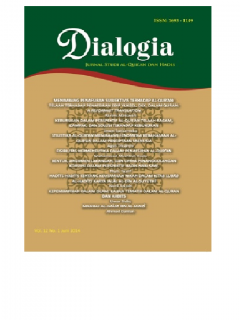Ditapis dengan

Rekonstruksi Metodologi Studi Islam (MSI) : Merubah Nalar Dan Bertindak Kosmo…
Two aspects in Islamic teachings are normative and historical aspects. These two aspects are always intertwined throughout history. However, there are some Muslims who were less notice one of that aspect, the historical aspect. As a result, they are romanticism and apathy in the face of changing times is always changing. Unfortunately, the current methods of Islamic studies, according to the wr…
- Edisi
- Dialogia, Vol 13 No 2 Desember 2015
- ISBN/ISSN
- 16931149
- Deskripsi Fisik
- ii ,10 hlm, 24 cm
- Judul Seri
- -
- No. Panggil
- J 2X0/23 Dia

Pemikiran Filsafat Ibnu Bajjah dan kontribusinya terhadap perkembangan Sains
As a scientist and also as a Muslim philosopher Ibn Bajjah not appear out of nowhere with no one before him. Based on the tradition Bajjah is a continuation of the tradition of Greek philosophical thought among Muslims developed by al-Kindi, al-Farabi, Ibn Sina and others. Philosophy Thinking of Bajjah includes questions of philosophy that flourished in the Classical era,was also the inspirati…
- Edisi
- Dinika, Vol 13,No 1 Jan-Jun 2015
- ISBN/ISSN
- 14112922
- Deskripsi Fisik
- ii , 24 hlm,: 24 cm
- Judul Seri
- -
- No. Panggil
- J 2X9 Din

Developing Human Resources Through science integration based epistemologi
- Edisi
- AT Tarbawi,Vol 12,No 2,Mei 2014
- ISBN/ISSN
- 16934032
- Deskripsi Fisik
- ii , 10 hlm,: 24 cm
- Judul Seri
- -
- No. Panggil
- J 297.77 Tar
- Edisi
- AT Tarbawi,Vol 12,No 2,Mei 2014
- ISBN/ISSN
- 16934032
- Deskripsi Fisik
- ii , 10 hlm,: 24 cm
- Judul Seri
- -
- No. Panggil
- J 297.77 Tar

Metodologi Penafsiran Teks : Memahami Ilmu Ushul Fiqh Sebagai Epistemologi Hukum
- Edisi
- cet. 1
- ISBN/ISSN
- 978-979-015-810-8
- Deskripsi Fisik
- xxi, 210 hlm. 22 cm.
- Judul Seri
- -
- No. Panggil
- T 297.402 Yas m
- Edisi
- cet. 1
- ISBN/ISSN
- 978-979-015-810-8
- Deskripsi Fisik
- xxi, 210 hlm. 22 cm.
- Judul Seri
- -
- No. Panggil
- T 297.402 Yas m

Epistemologi hisab rukyah : analisis perbedaan penetapan awal bulan dalam per…
Epistelogically, hisab [calculation] and rukyah [sight] are different subjects. Each of them has its own method, the basic, standard and validity of knowledge, so that the decisions they make are also different. Hisab is based on exact knowledge of astronomy and mathematics, while rukyah is based on normative postulates and empirical knowledge. Therefore, both can be said right in accordance wi…
- Edisi
- Ahkam14, Nomor 1, Juli 201201-24
- ISBN/ISSN
- -
- Deskripsi Fisik
- -
- Judul Seri
- -
- No. Panggil
- J 2X4.005 Ahk

Telaah Epistemologis terhadap Konsep Fitrah Murtadha Mutthahhari
- Edisi
- -
- ISBN/ISSN
- -
- Deskripsi Fisik
- xiv, 109 hlm. 28 cm.
- Judul Seri
- -
- No. Panggil
- KU-2014 014 AF
- Edisi
- -
- ISBN/ISSN
- -
- Deskripsi Fisik
- xiv, 109 hlm. 28 cm.
- Judul Seri
- -
- No. Panggil
- KU-2014 014 AF

Epistemologi pemecahan masalah menurut Karl R. Dopper : Alfons Taryadi
- Edisi
- Cet. 2
- ISBN/ISSN
- 979403598x
- Deskripsi Fisik
- xvi, 201 hlm. : 20 cm.
- Judul Seri
- -
- No. Panggil
- U 121 Tar e
- Edisi
- Cet. 2
- ISBN/ISSN
- 979403598x
- Deskripsi Fisik
- xvi, 201 hlm. : 20 cm.
- Judul Seri
- -
- No. Panggil
- U 121 Tar e

PEMIKIRAN ABDURRAHMAN WAHID TENTANG PRIBUMISASI ISLAM
This article explores the thought of “indigenization of Islam” of Abdurrahman Wahid’s. Indigenization of Islam is how the normative teachings of Islam as derived from God and it can be accommodated into the culture derived from human without losing its identity, respectively. As to Abdurrahmad Wahid or Gus Dur, Arabism (or process identifies with the Middle Eastern culture) would deprive …
- Edisi
- Teosofi, Vol.3, Nomor 1, Juni 2013
- ISBN/ISSN
- 20887957
- Deskripsi Fisik
- ii , 24 hlm,: 24 cm
- Judul Seri
- Tasawuf dan Pemikiran Islam
- No. Panggil
- J 2X5.2 Teo

Sosio epistemologi : Membangun pengetahuan berwatak sosial
- Edisi
- Cet. 1
- ISBN/ISSN
- 9789792134582
- Deskripsi Fisik
- 434 hlm. 22 cm.
- Judul Seri
- -
- No. Panggil
- T 618.51 Wat s
- Edisi
- Cet. 1
- ISBN/ISSN
- 9789792134582
- Deskripsi Fisik
- 434 hlm. 22 cm.
- Judul Seri
- -
- No. Panggil
- T 618.51 Wat s

Feminisme dalam realitas sosial : studi Epistemologi / Mumun Nurchasanah
NIM:E01394028.
- Edisi
- -
- ISBN/ISSN
- -
- Deskripsi Fisik
- ix, 103 hlm. : 28 cm.
- Judul Seri
- -
- No. Panggil
- K U-1998 13 AF
 Karya Umum
Karya Umum  Filsafat
Filsafat  Agama
Agama  Ilmu-ilmu Sosial
Ilmu-ilmu Sosial  Bahasa
Bahasa  Ilmu-ilmu Murni
Ilmu-ilmu Murni  Ilmu-ilmu Terapan
Ilmu-ilmu Terapan  Kesenian, Hiburan, dan Olahraga
Kesenian, Hiburan, dan Olahraga  Kesusastraan
Kesusastraan  Geografi dan Sejarah
Geografi dan Sejarah